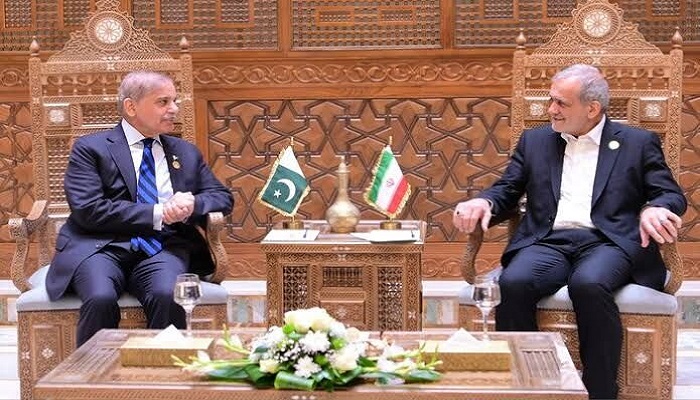PNN – The official visit of the Pakistani Prime Minister to the Islamic Republic of Iran, under the shadow of the two countries’ alignment with the “neighbors first” policy and the recent meetings of high-ranking officials in Tehran and Islamabad, promises a new chapter in brotherly relations and regional convergence between them.
According to the report of Pakistan News Network, it was on these days last year that Shahbaz Sharif traveled to Tehran at the head of a high-ranking delegation and presented a message of condolences and sympathy from the people and government of Pakistan to the nation and government of the Islamic Republic of Iran following the martyrdom of the late President of the 13th government, Seyyed Ebrahim Raisi, and his companions in the heartbreaking helicopter accident.
During this visit, he also met with the Supreme Leader of the Islamic Revolution, Ayatollah Seyyed Ali Khamenei. This visit not only expressed sympathy and solidarity, but also paved the way for strengthening bilateral relations at various levels.
Shahbaz Sharif also hosted the late Iranian President in Islamabad last spring. From the perspective of Pakistani officials, the Islamic Republic of Iran’s “neighbors first” policy is fully in line with Islamabad’s vision for regional development and connectivity, and Iran’s eastern neighbor is determined to further expand cooperation between them.
Read more:
Pakistani Prime Minister meets Turkish President in Istanbul
From solidarity with Gaza to condemnation of Israeli aggression; Pakistan and Iran on the path of strategic engagement
Continuing this trend, reciprocal visits by officials from the two countries, including the visit of Iranian Foreign Minister Seyyed Abbas Araqchi, demonstrate Tehran’s serious determination to enhance cooperation in the political, economic, and security fields.
The head of Iran’s diplomatic service also paid an official visit to Islamabad in mid-November last year. Ten days before this visit, the Pakistani Prime Minister condemned the Zionist regime’s aggression against Iran and announced that Islamabad stands by Tehran.
Both neighboring countries have always been considered strong defenders of the Palestinian people on national, regional, and international stages, and this common characteristic of Iran and Pakistan became more prominent after the Al-Aqsa Storm operation of the Quds Force against the Zionist enemy.
The importance of Iran’s regional diplomacy from the perspective of Pakistanis
The Islamic Republic of Iran was among the first countries to follow with concern the developments between New Delhi and Islamabad after the incident in Pahalgam on May 20 this year. Dr. Araghchi had a telephone conversation with his Pakistani counterpart and announced Tehran’s readiness to help de-escalate tensions in South Asia. In this regard, the head of Iran’s diplomatic service also made an important trip to Islamabad on May 5 and met with high-ranking Pakistani political and military officials.
Three days later, our country’s Foreign Minister paid an official visit to India and, along with bilateral consultations, pursued solutions to help de-escalate tensions in the subcontinent.
Dr. Masoud Pezishkiyan, President of the Islamic Republic of Iran, also held a separate telephone conversation with the Prime Ministers of India and Pakistan, urging them to resolve tensions through restraint and peaceful interaction.
However, the situation between the two neighbors led to a military clash. India launched an operation inside Pakistan, which New Delhi claimed was against terrorist sanctuaries. Pakistan responded to the attack, claiming to have shot down six Indian fighter jets.
A second Indian missile attack also took place on some parts of Pakistan, and hours later, the Pakistani army announced the implementation of a military operation called “Operation Marsus” on Indian soil. That evening, the two neighboring countries agreed to a ceasefire.
The Islamic Republic of Iran, welcoming the ceasefire between India and Pakistan, once again emphasized the importance of diplomacy between these two neighbors and avoiding escalating tensions, which would benefit third parties, especially the Zionist regime.
The Pakistani Prime Minister also appreciated Iran’s friendly, brotherly, and compassionate efforts to help de-escalate tensions in the subcontinent during a phone call with Dr. Pezishkiyan.
Iran and Pakistan’s New Roadmap: From Border Security to Economic Prosperity
Given their shared borders and security challenges in border areas, the two countries emphasize the importance of security and economic cooperation.
During the late Iranian President’s visit to Pakistan last year, eight cooperation documents were signed in the fields of trade, science and technology, agriculture, health, culture, and legal and judicial issues, and it is expected that the prevailing conditions will improve further.
Also, joint projects such as the Iran-Pakistan gas pipeline and connecting the two countries’ railway networks are among the strategic plans to strengthen economic and energy infrastructure.
Iran-Pakistan relations: A bond beyond borders and religion
Relations between Iran and Pakistan are rooted in shared history, culture, and religion. These deep ties have paved the way for extensive cooperation in various fields.
During the recent visit of the Iranian Foreign Minister to Pakistan, the two sides emphasized the importance of cultural, economic, and political cooperation, and the two sides agreed to strengthen mutual interactions through regular exchange of high-level meetings to strengthen brotherly relations.
Given recent developments and the efforts of the two countries to strengthen bilateral cooperation, it can be expected that Iran-Pakistan relations will enter a new phase of convergence and development. This cooperation will not only benefit the two countries, but also regional stability and prosperity.
The Islamic Republic of Iran and Pakistan simultaneously play an active role in multilateral forums, including the Economic Cooperation Organization (ECO), the Organization of Islamic Cooperation, the Shanghai Cooperation Organization, and the D-8. Islamabad supported Tehran’s permanent membership in the SCO, and Iran supports Pakistan’s accession to BRICS.

